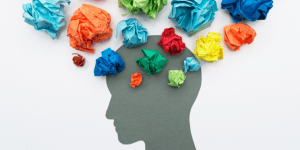 May is known for many things, but one of the most important is that it is Mental Health Awareness Month. Mental health awareness has been observed in May in the United States since 1949 and was started by the Mental Health America organization. Despite the fact that the topic seems very buzzy right now, mental health is an important part of our daily lives. Sadly, with war and sickness surrounding so many, having a healthy mind is becoming more difficult for everyone.
May is known for many things, but one of the most important is that it is Mental Health Awareness Month. Mental health awareness has been observed in May in the United States since 1949 and was started by the Mental Health America organization. Despite the fact that the topic seems very buzzy right now, mental health is an important part of our daily lives. Sadly, with war and sickness surrounding so many, having a healthy mind is becoming more difficult for everyone.
Mental health includes our emotional, psychological, and social well-being, according to mentalhealth.gov. In order to become healthy people, we need to have healthy minds and bodies. Doctors are constantly reminding us of ways to develop a healthy body (exercise, fruits, veggies), but what are some ways to create a healthy mind?
Thankfully, there are some wonderful resources available to anyone who seeks them out, either for yourself or someone you know is struggling. Here are some resources to try:
- MentalHealth.gov – Provides information for recognizing symptoms in someone struggling with a mental health issue, resources for getting help, and also links to other places to seek out help.
- American Foundation for Suicide Prevention – This website has a whole section devoted to Mental Health Awareness Month. In recent years, the number of suicides continues to climb due to isolation, fear, depression, and other factors people have been forced to deal with during the COVID-19 pandemic. Not only does this website have stories from people highlighting their journeys with mental health struggles, but it also links to places to find help.
- National Alliance on Mental Illness (NAMI) – NAMI fights stigma, provides support, educates the public, and advocates for policies that support people with mental illness and their families. They provide information on dealing with mental health issues, ways to get involved, and how share your story.
Local Mental Health Resources in Southeast Michigan
- The Women’s Center of Southeast Michigan – The Women’s Center promotes self-determination for women and families by providing professional services that build confidence, strengthen connections, and create positive change.
- Michigan Association for Suicide Prevention – Focuses on decreasing the number of suicides and attempts in Michigan, supporting those left behind, and reducing the stigma associated with mental illness and suicide.
- Michigan Mental Health Networker – Directory of Michigan mental health agencies.
Apps for Mental Wellness
In a world filled with smartphones, there are some wonderful apps for mental health available on iOS and Google platforms. Be sure to give them a try. Many include journaling, meditations, quick feeling check-ins, daily affirmations and more. These apps include:
- Stoic (iOS only)
- Daylio (iOS and Google)
- Reflectly (iOS and Google)
- I Am (iOS only)
- MindDoc (iOS and Google)
- Nuna (iOS and Google)
- Sanvello (iOS and Google)


Add a comment to: M is for Mental Health